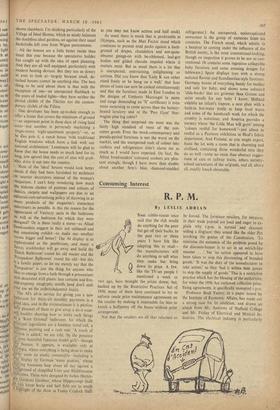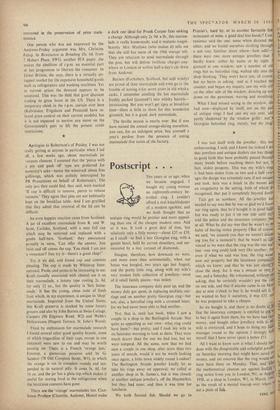Consuming Interest
R. P. M.
ADRIAN
By LESLIE
SOME rabble-rouser once said that the rich would do anything for the poor but get off their backs. In the past two or three years I have felt like adapting this to read— the manufacturers will do anything to sell what they make but bring down its price. A few, like the TV-set people I mentioned a week or two ago, have brought the prices down; but, backed up by the Restrictive Practices Act of 1956, many of them have continued to try to enforce resale price maintenance agreements on the retailer by making it impossible for him to knock a halfpenny off the beans without prior arrangement.
Not that the retailers are all that reluctant to be forced. The .furniture retailers, for instance, in their trade journal are loud and eager to ex- plain why, r.p.m. is normal and discount selling a disgrace; they sound like the elder Pitt invoking the genius of the Constitution. `To minimise the existence of the prol?lem posed by the discount-hunter is to act in an ostrich-like manner . . .' but `no action appeared to have been taken to stop this discounting of branded goods.' It was the duty of the manufacturer to take action,' as they `had it within their power to stop the supply of goods.' This is a restrictive practice which has the blessing of the authorities, for when the 1956 Act outlawed collective price- fixing agreements, it specificalli exempted r.p.m.
Professor Basil Yamey, in a paper issued by the Institute of Economic Affairs, has made out a strong case for its abolition, and drawn an attack from Mr. Andrews of Nuffield College and Mr. Friday of Electrical and Musical In- dustries. The electrical industry is particularly
interested in the preservation of price main- tenance.
One person who was not impressed by the Andrews-Friday argument was Mrs. Christina Fulop. In Revolution in Retailing (3s. 6d. from 7 Hobart Place, SW1), another [EA paper. she makes the abolition of r.p.m. an essential part at her programme to liberate the consumer. In Great Britain, she says, there is a virtually un- tapped market for the expensive household goods such as refrigerators and washing machines. Yet at current prices the demand appears to be saturated. This was the field that gave discount trading its great boost in the US. There is a temporary chink in the r.p.m. curtain over here (Kelvinator, Frigidaire and Prestcold have re- laxed price control on their current models), but it is not expected to survive any move on the Government's part to lift the present credit restrictions.
Apologies to Robertson's of Paisley. I was not really getting at anyone in particular when I led off, a few weeks ago, about marmalade jar vacuum closures. I assumed that the 'pierce with a pin and push off' type are preferred for economy's sake—hence the wisecrack about free golliwogs, which was politely intercepted by PR Promotions on behalf of Robertson's. The only jars they could find, they said, were marked 'If cap is difficult to remove, pierce to release vacuum.' They agree that pins are not habitually kept on the breakfast table. And I am gratified that they admit that removal of the lid can be difficult.
An even happier reaction came from Scotland. A jar of excellent marmalade from R. and W. Scott, Carluke, Scotland, with a neat foil cap which may be removed and replaced with a gentle half-turn. 'Scotland,' they announced proudly in verse, 'Can offer the answer, Just twist and off comes the cap. You think I am just a romancer? Just try it—there's a good chap!'
Try it we did, and found cap and contents pleasing. The cap is made by Whitecap Inter- national, Poole, and seems to be increasing in use. Kraft (usually associated with cheese) use it on their marmalade, a luxury type costing 2s. 8d. for only 12 oz., but the quality is 'best home- made.' It has the young, clean taste of fresh fruit which, in my experience, is unique in 'shop' marmalade. Imported- from the United States, this Kraft preserve is stocked by some luxury grocers and also by John Barnes at Swiss Cottage, Coopers (90 Edgware Road, W2) and Webb's Delicatessen (Nugent Terrace, St. John's Wood).
Fired by enthusiasm for marmalade research I found several other good quality brands, some or which (regardless of their caps, except in one instance) were new to me and may be worth passing on. There is a French 'orange jam,' Em mop, a glamorous preserve sold by G. Sandret (70 Old Compton Street, WI), in which the orange is cut in complete rounds and sus- pended in its natural jelly. It costs 5s. 4d. for 16 oz. and the jar has a glass top which makes it useful for storing food in the refrigerator when the luxurious contents have gone.
There are the 'vintage' marmalades too. Clan- house Produce (Clanville, Andover, Hants) make
a dark one ideal for Frank Cooper fans seeking a change. Although only 2s. 9d. a lb., this marina- lade is really home-made, and it matures magni- ficently Mrs. Marlowe (who makes it) tells me that she still has some of the 1960 vintage left. They are reluctant to send marmalade through the post, but will deliver (without charge) any- where in London or within half-a-day's car drive from Andover.
Baxters (Fochabers, Scotland, but sold widely) are proud of their marmalade and even go to the trouble of storing it for seven years in old whisky casks. I remember smelling the hot marmalade freshly packed (jammed?) into whisky barrels— intoxicating. But you won't get tipsy at breakfast time—there is little to show for this wonderful gimmick, but it is good, dark marmalade.
The Seville season is nearly over. But if you have missed the annual orange-slicing marathon, you can, for an indulgent price, buy yourself a year's pardon from the penance of eating marmalade that tastes of the factory.







































 Previous page
Previous page